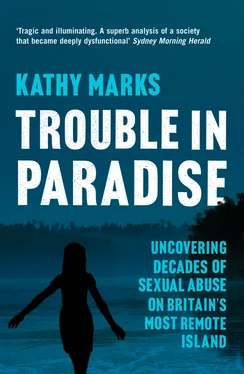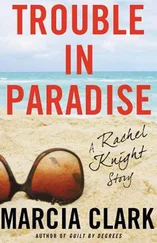For the local boys, joining the crew is a rite of passage, and they long to be skipper or coxswain, just like other boys dream of driving a train. The coxswain has the most kudos of anyone on the island. In an exceptionally macho society, he is the most macho figure of all.
Steve has been a coxswain since the age of 17. Randy—the only one of Steve’s sons living on the island, and thus seen as the heir apparent to his political power—is a coxswain. So is Dave Brown. So is Jay Warren. Those men were always at the back of the boat, in charge of the tiller or engine. Len Brown, who in his day headed one of Pitcairn’s leading families, was among the island’s most capable engineers and coxswains.
Vaine Peu, Simon Young and Mike Lupton-Christian had all asked to be trained for the key roles. But the locals were unenthusiastic, for according to them, you had to have grown up on Pitcairn. So ‘the boys’, as they were known, continued to control the longboat—and, with it, the community’s access to resources, its economy, its very survival.
As of 2004, Steve and Randy occupied the highest-ranking official positions on Pitcairn. As mayor, Steve was the community leader and chairman of the local council, which administers the island day to day. (The Governor wields overall authority.) Randy was chairman of the influential internal committee, which, among other things, allocated jobs. The pair also headed the unofficial hierarchy, for the real power base on the island was not the public hall, where the council met monthly, but Big Fence, Steve’s family home, where important decisions were made by his ‘inner circle’, and the same men gathered on Friday nights for rowdy drinking sessions.
Only native-born Pitcairners were part of the gang. Outsiders, particularly men, were regarded with hostility and suspicion. Steve and his mates, it is said, saw them as a threat to their jobs, and to the cosy way they ran the place for their own benefit. ‘They hate outsiders with a vengeance,’ a former Pitcairn teacher told me. ‘It’s their rock, and they don’t want anyone else on it.’
At the same time, Pitcairn is desperate for new blood. From a high of 227 in 1937, the population has dropped to around 50. Yet as much as newcomers are needed, they are feared and disliked, and also looked down on, because they lack the Bounty lineage. The locals ridicule them for breaking invisible protocols, and say of them in Pitkern that they ‘cah wipe’—do everything wrong.
According to Mike Lupton-Christian, as an outsider, ‘you’re actually treated quite badly … They don’t like people coming in with new ideas or doing anything better than them. You become very unpopular if you disagree with them.’ Mike’s house, built high on a hillside overlooking the Pacific, is derisively called ‘Pommy Ridge’ by other islanders.
In the past, some newcomers have turned up starry-eyed and then left, unable to deal with the hardships of Pitcairn life. But outsiders are expected to fail. Nola Warren, one of the matriarchs, says, ‘People from outside can’t live here. They’ll never settle down. They wouldn’t be able to cope.’
Some are not given much of a chance. Nicola Ludwig and Hendrik Roos, from the German city of Leipzig, were ideal immigrants: young, strong and fit, with small children. They loved the outdoors, and were eager to adopt a self-sufficient lifestyle. Nicola, whose family is now in New Zealand, told me recently, ‘We went to Pitcairn for an adventure and to get away from the outside world. We were absolutely naïve about the place. We thought it was this little community full of greenies, where everyone is nice to each other.’ Although Hendrik pitched in, particularly on the boats, the Pitcairn men ostracised him and subjected him to anti-German insults. Eighteen months after the family arrived, a container ship offered them a free passage to Auckland. They packed up and left.
Some islanders are treated as outsiders, too. Brenda Christian—small, but very strong and fit—is always in the thick of it with the men, flitting around the boats and shouldering heavy loads. Yet Brenda is not considered a true Pitcairner. She left the island at the age of 18 and did not return until 30 years later.
Like Brenda, Pawl Warren has an obvious rapport with island life. Shaven-headed Pawl, who gave us a fright when we first saw him on the longboat, left Pitcairn as a baby and grew up in New Zealand. In 1993, inspired by the Hollywood films about the mutiny, he moved back with his wife, Lorraine, and three children. Pawl describes the island as ‘a magical place’, but adds, ‘It’s not been easy to fit in here, because the hierarchy was already established.’
Even locals who have not lived away may experience similar problems. Tom and Betty Christian—elders of the Church, well travelled, well read and relatively affluent—are envied and distrusted by many of their fellow islanders. The couple, who have pioneered most of Pitcairn’s commercial ventures and undertaken overseas trips sponsored by the Adventist Church, find themselves increasingly isolated in their own community.
In the early 1990s, in an effort to boost the population, British administrators introduced a scheme to attract young Norfolk Islanders. A few people took up the offer of work and cheap housing; none of them ended up staying for long. Even Randy Christian’s wife, Nadine, who has married into the island’s most powerful family, confides, ‘The Pitcairners have their own way of doing things. I’ve had to try and do stuff the Pitcairn way, but it’s very difficult.’
I asked Matthew Forbes, Karen Wolstenholme’s successor as Deputy Governor, who, in his opinion, had been the last outsider to settle successfully on the island. After a long pause, Forbes suggested Samuel Warren, an American whaler who arrived in 1864.
Nadine, Steve Christian’s daughter-in-law, had been one of the talkative women at the Big Fence meeting; for the time being, she and other female relatives were as close as we would get to Steve. However, we soon came to know his voice well, thanks to the VHF radio system that is Pitcairn’s domestic telephone network. Every house and public building has a VHF unit. If you want to speak to someone, you holler out their name three times on the main frequency, Channel 16. (Only a first name is needed.) When they respond, the two of you switch to another channel—and everyone else adjusts their sets, in order to eavesdrop.
The radio in our living room crackled into life dozens of times a day, as the islanders got in touch with each other to chat or make plans. Steve’s rich tones rang out frequently. He might have been about to go on trial, but he was, unmistakably, still in charge. It was he who made public announcements, informing people when the next ship would be calling, or telling them not to worry if they saw smoke rising—‘We’re just burning rubbish.’
While Steve was elected mayor in 1999, unofficially he had been a leader since his teens. Good-looking, self-confident and powerfully built, he had always stood out: cleverer than his peers, a bit more articulate, and possessing a certain raw charm. His late father, Ivan, had been magistrate for eight years, and his mother, Dobrey, remains a formidable woman. Despite a strict upbringing, Steve was described as a tearaway by a Royal Air Force team stationed on Pitcairn in the 1970s, when he was in his early 20s. In a report to British authorities, the team also tipped him as a ‘future strongman’, and said that he would be a ‘severe loss’ if he decided to emigrate. Steve never did leave, except for limited periods, and that has been a source of strength.
In his youth, Steve had the pick of the local girls, and he eventually married Olive Brown, Len’s eldest daughter, although—much to people’s amusement—he reportedly also had affairs with her two younger sisters; he was referred to as ‘the man with three wives’. The birth of three sons, Trent, Randy and Shawn, consolidated his status. In addition, Steve has a multitude of talents. It is said of him that he can fix anything, and that he is a person who gets things done. A few years ago, when the islanders were heading home in a gale and rough seas, a rope got caught in the longboat’s propeller. Steve dived overboard, cut the rope and was back in the boat before some of its occupants had realised anything was amiss.
Читать дальше












